- Home
- Claire Legrand
Summerfall: A Winterspell Novella Page 4
Summerfall: A Winterspell Novella Read online
Page 4
“Yes, but you met him before that, didn’t you?”
Rinka nearly dropped her cup. “Well, yes, my queen. The day I arrived, I went for an afternoon ride in the forest north of the castle. The king had been hunting, and was wounded. I helped him back to the stables, where his guards attended him inside.” She paused, meeting the queen’s eyes. Her mind raced through that day, as it had done many times since, searching for wrongdoing. “I’m afraid I didn’t know who he was until we’d arrived back at the castle. You can imagine my embarrassment.”
“You didn’t know who he was?” Queen Liane laughed and shot a skeptical look at her handmaidens. “Can you believe it? Not recognizing the High King of Cane. But then, faeries know little of the world outside their forests and their strange moving villages. Isn’t that right, Countess?”
“On the contrary, my queen,” Rinka said, swallowing her indignation, “I’ve studied your culture and customs for years.”
The queen seemed surprised, and her eyes narrowed. “Have you? I’ve heard the faery Council has begun discouraging such learning in recent years. That they have been advocating an attitude of isolation.”
“Some on the Council have, yes,” Rinka conceded. “But it’s not an attitude held by everyone. Many, like myself, think that encouraging education, and cooperation across cultures, is more important than ever during troubled times.”
“Is that what you consider this to be? A troubled time between our people?”
Rinka considered retracting her own words, but only for a moment. She trusted candor; it had always served her well.
“I do, my queen,” she said. “But I believe this tension to be misguided, the result of misunderstanding rather than true discord.”
The queen gave a small smile that Rinka couldn’t interpret. “And you have come here to correct that misunderstanding, Countess?”
“I and the others of my delegation, yes. It is our hope to . . .” She paused, searching for the right words. “To build a bridge between our two peoples. We are all children of one kingdom, are we not? Why, then, should we be at odds?”
“You are frank, Countess,” said Liane, still with that strange smile. “I appreciate that.”
“Thank you, my—”
“I’m sure it was alarming, to be in such close proximity to a human man for the first time. I’m sure you found yourself flustered.” And with that, the mood shifted. “Perhaps that is why you found yourself incapable of recognizing your king that day?”
Rinka managed a smile. What game was the queen playing?
“I admit it was startling, my queen. They are . . . loud, dirty creatures.”
The queen laughed, echoed by her handmaidens, and rose. Rinka followed with a curtsy.
“You are amusing, Countess,” said the queen. “We are all so pleased you’ve come to Erstadt.”
Then Liane glided away, her handmaidens trailing out after her.
Rinka sank into her chair, unsteady. Leska hurried out of the bedroom.
“Well,” said Leska, taking the queen’s vacated seat, “that was certainly interesting.”
Rinka narrowed her eyes. “It’s low work, isn’t it? Tying braids, fastening gowns? It must be a welcome diversion to listen in on others’ conversations.”
“Countess—”
“Tell me, Leska, why did you, a mage apprentice, request to be appointed my handmaiden? It seems an ill match for someone of your accomplishments.” Garen’s pendant, at Rinka’s neck, vibrated in response to her anger—quietly, but even so.
Leska’s gaze flickered to it and back up. “Do you distrust mages, Countess?”
“I distrust suspicious appointments. I’ve no reason to distrust mages.”
“And I’ve no reason to distrust faeries.”
“Then why? To spy on me?”
“No. To protect you.”
Taken aback, Rinka stared. “Whatever for?”
“Come, Countess,” said Leska gently. “You know why you’ve been summoned here. Unrest is building between humans and faeries, and you are here to see it doesn’t escalate beyond that. But there are those who—”
“Who want it to escalate.” Rinka rose and went to the window, hugging herself. The city was a dazzling expanse of white. Even considering her delegation’s cool reception, she could not believe this place could conceal the kind of evil her father and Garen had warned her about, the kind of evil hinted at in Leska’s careful words.
“Do you believe,” Rinka said quietly, “that there really could be war?”
“Yes, if certain people have their way. I think the rumors troubling your people are the product of a small group of humans and mages making horrible decisions.” Leska paused. “I hope it is small.”
“This group must be powerful, though, to have caused such a fuss.” Rinka sighed, toying with the curtains. They were emblazoned with the royal crest—the sea serpent, long and coiled. The Somerhart family’s sigil. “I confess, I worry that if there was ever a war, we faeries would fall. The land listens to humans, it recognizes them as the rulers of Cane. The king could easily use his bound mages to work the land in his favor, and against us.” She let the fabric fall. These were not thoughts she welcomed, or suspicions she had ever wanted to give credence. And yet how could she not think them, considering Leska’s ominous warnings and the queen’s peculiar behavior?
“How could we possibly fight against the land itself, if it comes to that?” Rinka said.
Leska was quiet for a long time. “Countess, I’ll leave you to your thoughts, but I will say this: Peace is important to me, and if I can help one of those tasked to maintain it, then I’ll do so gladly.”
Rinka turned, an uncertain smile on her lips. “You are comfortingly forthright, Leska.”
Leska inclined her head. “As are you, Countess.”
“Why can’t all the world be this way? It seems a simple thing.”
“To that, I have no answer. But I do know we don’t all have to like each other in order to live with each other. And that’s what I want to help others understand.” Leska made for the door and then turned back, considering her. “So you have met the king, then?”
Rinka bristled, thoughts of war abruptly forgotten. “It was only one time that I saw him. Only once. And even that was an accident. I did nothing wrong.”
“Of course you didn’t,” said Leska.
“You believe me, don’t you?”
A pause. Then Leska said, “Yes, but I’m not the one you have to worry about. The queen has spies. They move about like birds, and they do her bidding without question.” She frowned, thoughtful. “Be careful, Countess.”
Rinka stepped away from the window. “I came here to represent my people. To work toward peace and understanding. That’s all.”
Leska gave her a small smile. “I know. That’s obvious to me. Now, come. They’ll be waiting for you downstairs.”
Rinka followed her, and somewhere along the route to the Great Room, where they did much of their work, Leska left for one of the western towers, for her studies, and Rinka was left alone. And though she knew her heart was true, that she meant what she had told Leska, she nevertheless found herself holding her breath each time she turned a corner, and hoping, for reasons she couldn’t put into words, to see a face she knew she shouldn’t want to see.
5
IT TOOK SOME TIME for Rinka to hear from her father, and when a letter from him did arrive, two days after her tea with the queen, Rinka left it on the table in her sitting room for hours before finding the courage to open it.
There was no greeting, and certainly no hint of affection. Only Kaspar’s erratic scrawl, the one that manifested when he was writing while in the grip of great emotion.
The only reason I have not come to bring you home, the note read, is a desire to maintain both our reputations. I will not insult you—or myself—by dragging you out of the capital like an errant child.
I hope you are proud of what you have done.
/> “And I hope you’re proud of yourself, Father,” Rinka muttered, glaring at the paper, “for driving me to deception.”
Then she crumpled up the letter and threw it into the fire.
* * *
One morning, a month after the faeries’ arrival at Erstadt, news arrived from the eastern highlands, near the border of the faery lands. A school there had been attacked by a group of faeries who had been stirring up trouble in the highlands for quite some time. The mage teachers—and the human students—were being held hostage until, according to the faeries holding them, the crown admitted to crimes of abducting faeries for magical experimentation.
Grave news, and a great blow to the work Rinka and the rest of the faery delegation, the Seven mages, and the queen and her advisors had accomplished during the past month. They had arranged meetings between leaders of villages in the more tumultuous areas along the border, and developed literature to be distributed in Erstadt schools, to educate human students on the truth of faery culture rather than wild hearsay. It was good progress, steady progress.
Despite their reception that first day, despite her continuing uneasiness since her tea with the queen, Rinka felt that together, their unlikely group was doing great work. She thought she had even begun to notice the Seven mages’ frosty temperaments thaw.
But now, with this news, everything seemed poised to change. Children held hostage, undoubtedly having to see their teachers be mistreated—and hopefully not mistreated themselves. Rinka felt sick to hear of it. She saw the anger rippling around the long table in the Great Room when Commander Henning, head of the royal army, announced the news. She felt the humans and mages shift away from the faeries among them—barely, but still noticeable. She saw the quiet anger on their faces.
Rinka met Queen Liane’s piercing gaze and did not look away.
For two hours, they pored over reports of the incident and consulted with Commander Henning. They strategized and debated the best course of action—except for Rinka, who had, since hearing the news, felt disoriented, like something inside her had shifted out of place. Like something was about to happen.
Then, in the early afternoon, King Alban burst in, banging open the doors and storming across the room. Everyone fell silent and stood to receive him.
Rinka kept her eyes trained on the ground for as long as she could without drawing attention to herself. He was here. He was here, and it didn’t make sense that her heart should be racing like this, that it should be suddenly impossible to sense anything in the room but his tall, disheveled presence. But her heartbeat was not slowing. Every inch of her skin felt charged with a new attentiveness that made her gown seem uncomfortable and restrictive. It wasn’t until after everyone had taken their seats and resumed conversation, and Commander Henning began summarizing the meeting thus far for the king, that Rinka dared to look up.
King Alban was watching her.
He was trying not to; he was obviously trying to concentrate on Commander Henning’s words, on the reports before him. But his eyes kept flicking to Rinka.
Rinka kept her face impassive. Anything else would admit guilt, or discomfort, when there was nothing to feel guilty about, and it would be a show of weakness to reveal discomfort. She had done nothing wrong. And anyway, she thought, maybe she had imagined the connection between them, that day.
So she kept her head high, her expression dutiful, even when Alban’s distraction became apparent to everyone.
Beside Rinka, Garen shifted restlessly.
Commander Henning fell silent and cleared his throat. “Your Majesty?”
“What do you think, Countess Rinka?” said the king, watching her and ignoring everyone else—even the queen, whose expression Rinka couldn’t read. “I’ve heard it said you know much about these troubled regions.”
“I do, my king.” Rinka’s voice was steady, and she rose. She would not be intimidated by her own nerves. She met the eyes of everyone in the room as she spoke. “I’ve spent the past few years studying not only the customs of humans but also paying particular attention to lands along the border heavily occupied by both faeries and humans, in order to better understand our cultural and political clashes in these regions.” She came around the table to stand before the map of the highlands, which Henning had spread out over the table. “The islands south of the highlands in the Whispering Sea, known as the Queen’s Keys, are dangerous and quite remote. Certain faery clans have been able to live there without much influence from the crown or humans whatsoever. This isolation, combined with the bits of gossip they glean from trading vessels, has bred much intolerance and prejudice, allowing fanatic groups like the one holding the hostages to form there unchecked.”
Rinka fell into the rhythm of her knowledge, retreating into the comfort of its familiarity. She described to Henning important features of the southern landscape the royal cartographers had missed. As Rinka spoke, the king came around the table to stand beside her. Absorbed in her conversation with Henning and his captains, Rinka did not at first notice Alban had moved.
But then he stepped close—far closer than was appropriate—and his arm brushed against Rinka’s. Jolted, she paused, her speech faltering.
“I suggest,” said the king, moving away, “that we appoint Countess Rinka to work closely with myself and Commander Henning to organize this rescue mission. Obviously, she knows much about this region. Combined with Henning’s military experience, her knowledge should help bring us success with minimal losses.” King Alban paused at the head of the table and looked to his wife. “Don’t you agree, my love?”
The queen smiled tightly. “Yes, that does seem a wise plan, darling. And the countess will no doubt jump at the chance to prove her expertise.”
One of the Seven mages—Rohlmeyer, First of the Seven—stifled a laugh.
“And when we apprehend these faeries,” continued the king, his attention returned to Rinka, “what do you suggest we do with them?”
Rinka hesitated, sensing the import of the moment, that it might be some sort of test. But Alban’s expression was open, even earnest. She had the impression that her answer would matter a great deal to him.
The queen spoke first. “Surely you’re joking, Alban,” she said. “You know as well as any of us—”
“I don’t want to hear your talk of torture,” Alban interrupted, not even sparing her a glance, his voice clipped with anger. “I asked the countess for her opinion.”
Rinka felt the atmosphere of the room shift. Everyone was looking at her; Garen seemed dumbstruck, and the queen’s eyes were like blades. The other faery delegates wore expressions of shocked outrage.
Torture? That such a thing could ever be considered by anyone at this table . . .
“I think,” Rinka said slowly, fighting past her own shock, “that torture, my king, is a cruel practice, no matter the crime, and should not be permitted. I think those responsible for this attack should be questioned, given a fair trial, and assigned punishment in accordance with royal law, which I know to be decent and fair.”
“You know much about royal law?”
Rinka set her jaw. “I have studied it for years, as any responsible citizen of Cane should, so, yes, my king. I do.”
A long moment passed, and then the king nodded. “Well,” he said with some finality, “I find myself inclined to agree with the countess. Surely we can impress upon wrongdoers the evil of their actions without becoming evil ourselves.”
“But, my king,” began Rohlmeyer quietly, “we must communicate to the populace the unacceptable nature of these faeries’ actions. Violence must be returned with violence. Anything less—”
“Lord Rohlmeyer, I wish to hear nothing more on the matter.” Alban paused, raised his eyebrows. “Is that understood?”
Rohlmeyer blinked, settled back into his chair. A tiny wave of cold magic drifted out from Rohlmeyer, as if he had let out a small sigh. Rinka felt her own magic rise instinctively within her, and quelled it—and prayed that h
er fellow delegates could manage the same. If one of them gave in to anger and broke their promise to not use magic while at court . . .
But then Rohlmeyer intoned, “Of course, my king.” Rinka relaxed, and felt Garen and the others do the same.
And that, it seemed, was that—though the mages and Commander Henning seemed struck with varying degrees of surprise at what had transpired, and Queen Liane spent much of the rest of the meeting watching the king as though trying to puzzle him out. Perhaps unaccustomed to someone—much less her husband—telling her what to do? Obviously, everyone had expected Alban to agree with the idea of torture; they had not expected anyone to even attempt to persuade him otherwise. Realizing this left Rinka agitated. Somehow she endured the rest of the meeting, answering when spoken to, offering suggestions when appropriate, until Henning blessedly proposed they break for lunch.
Rinka could not leave the room quickly enough, her body a mess of tangled nerves, her gown clinging to clammy skin.
And yet when she reached the haven of her rooms, she found she couldn’t help feeling pleased. She had done well. She was happy to have done well—in front of the king, yes, but to simply have worked for something good, to have proven herself useful and spoken out against cruelty.
This was what she had studied and hoped for: the ability to effect change, the opportunity to not only quell violence but also to create understanding between races struggling to find it.
She leaned against her sitting room window. The glass was cool against her cheek. She watched the bustle of the city far below Wahlkraft’s towers, and in this quiet moment of pride, she did not think of the king.
Until a knock came at her door.
When Rinka answered it, she was surprised to see the king standing there, his hands behind his back and his expression strangely contrite. Even . . . nervous. He had never seemed less kingly, even with mud on his face.
“Countess,” he said, glancing behind her. “Where is your young mage?”

 Furyborn
Furyborn Queen of the Blazing Throne
Queen of the Blazing Throne Lightbringer
Lightbringer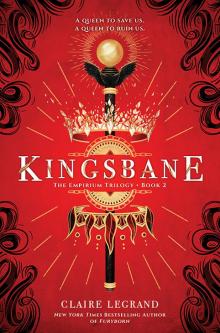 Kingsbane
Kingsbane Cavendish Home for Boys and Girls
Cavendish Home for Boys and Girls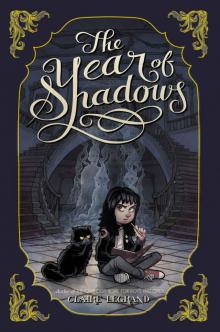 The Year of Shadows
The Year of Shadows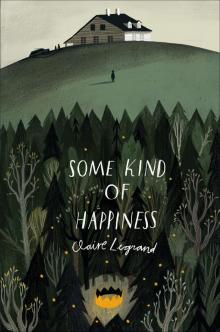 Some Kind of Happiness
Some Kind of Happiness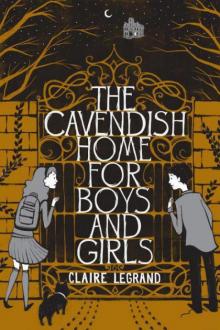 The Cavendish Home for Boys and Girls
The Cavendish Home for Boys and Girls Sawkill Girls
Sawkill Girls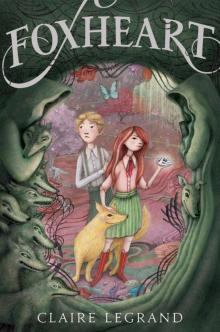 Foxheart
Foxheart Summerfall: A Winterspell Novella
Summerfall: A Winterspell Novella